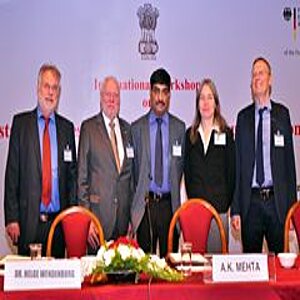India drives forward its resource efficiency and recycling efforts

How an IKI project is supporting India in its endeavours to use raw materials efficiently.
India is one of the world’s most heavily populated countries with a constantly growing demand for resources. Forecasts expect India’s materials consumption to increase fourfold by 2050. Currently, materials such as electrical scrap, packaging and end-of-life vehicles are predominantly recycled in the informal sector, so that reusable raw materials are only ever downcycled1 and a significant percentage of valuable resources that could be returned to the economic cycle end up in landfills. Improving this situation could help to lower resource consumption and bring about considerable reductions in greenhouse gases. A project entitled Resource efficiency and secondary raw materials management as a contribution to climate change mitigation, which is funded by the German Ministry for the Environment, Nature Conservation, Building and Nuclear Safety (BMUB) under its International Climate Initiative (IKI), is advising its Indian partner on strengthening its waste management policy to include a smart management system that will facilitate efficient use of resources and recycling to increase the use of secondary raw materials.
An international workshop on this subject – specifically on Extended Producer Responsibility (EPR) – took place in New Delhi from 12 to 13 May 2016. Over 100 participants from the fields of politics, the private sector, trade associations, civil society and the scientific and academic community shared their knowledge, experience and ideas connected with EPR, and discussed the possibility of introducing an EPR system in India that would be appropriate in the Indian context. EPR is a key instrument for preventing waste generation; it makes manufacturers of a product responsible for its sustainable design and for its disposal, thus preventing waste and stimulating the circular economy.
The workshop was jointly organised by the Organisation for Economic Co-operation and Development (OECD), the Indian Ministry of Environment, Forests and Climate Change (MoEFCC) and the Deutsche Gesellschaft für Internationale Zusammenarbeit (GIZ) GmbH. International and national speakers gave presentations on managing recycling materials from different sectors, such as electronic scrap, end-of-life vehicles and plastic packaging.
The project reached a key milestone in October 2015 when it set up an Indian Resource Panel (InRP) – the first national advisory body on resource efficiency. The idea is that the Indian Government will adopt InRP’s recommendations for action on resource productivity and secondary raw material management in order to reconcile the country’s industrial development with the need to mitigate climate change and protect the environment. BMUB has been supporting the three-year project in India since 2014 with funding totalling 3 million euros.
1 Downcycled material does not achieve its original quality or cannot be processed in the same way as was possible during primary manufacture before the recycling process.
The link has been copied to the clipboard
Contact
IKI Office
Zukunft – Umwelt – Gesellschaft (ZUG) gGmbH
Stresemannstraße 69-71
10963 Berlin






